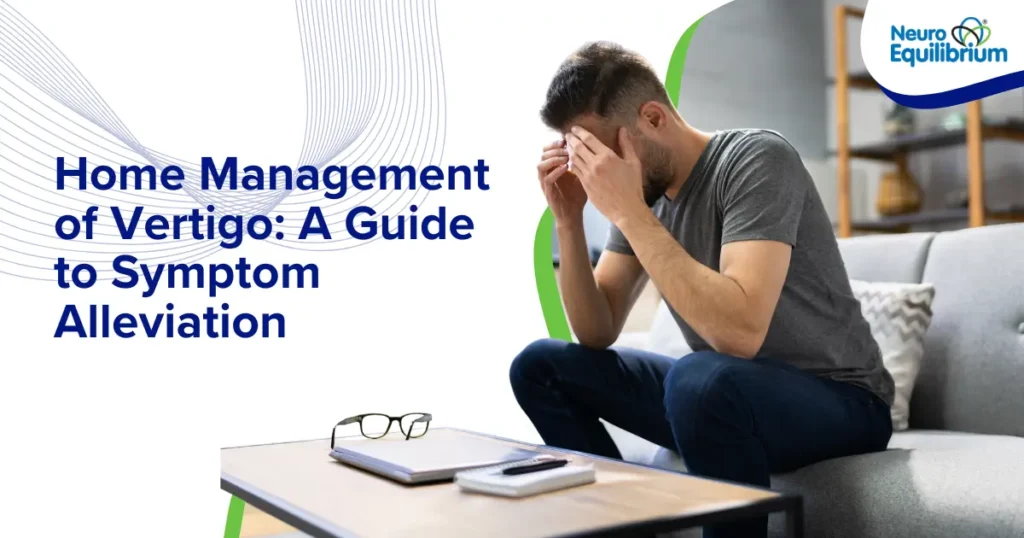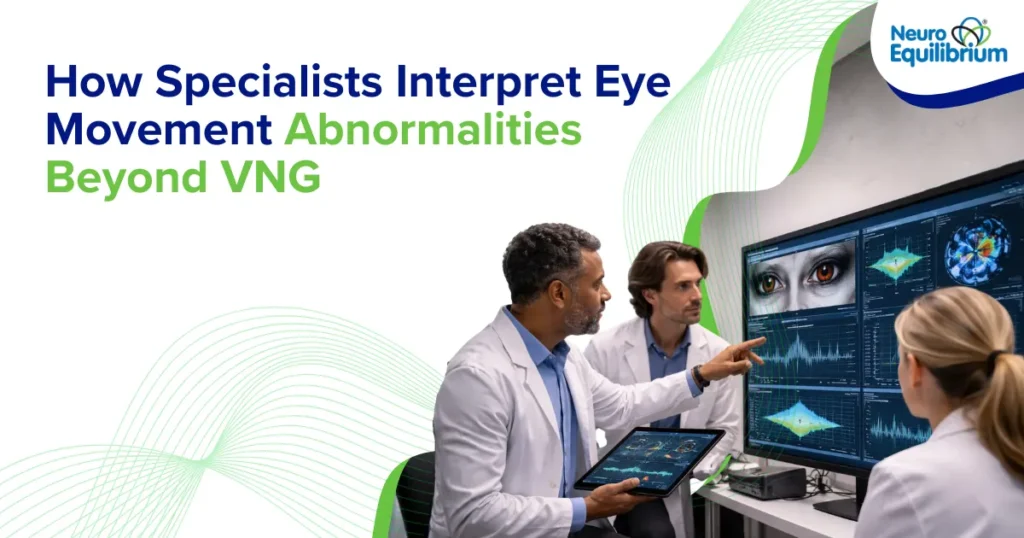The spinning feeling you experience—vertigo—is actually a symptom, not a condition in itself. It can be caused by various medical issues. While it’s tempting to treat it on your own, self-medicating isn’t a permanent / suitable solution.
There are some home management tips that can help, but they can’t replace a professional diagnosis. Only a healthcare expert can figure out what’s really causing the vertigo and give you the right treatment that works for your specific situation.
So if you’re feeling dizzy, don’t just guess—get a proper diagnosis to find the cause and start the right treatment.
Know More About Vertigo
- What is Vertigo? Causes, Symptoms, & Treatment
- Beware of Falls: The Importance of Fall Prevention in Elderly
- Top 3 Essential Vertigo Tests: How to Identify and Manage Balance Disorders
Immediate Actions During a Vertigo Episode
If you’re feeling dizzy from vertigo, it’s important to stay safe. Whenever an episode hits, find a safe spot to sit or lie down—this helps prevent falls or accidents.
Keeping stress levels under control remains essential because anxiety levels can make vertigo worse and therefore maintain a state of relaxation. The identification of vertigo triggers through tracking will help you to manage the symptoms in a better way in case of future attacks.
Keep a lookout for other symptoms that emerge with vertigo because severe headaches along with blurry or double vision and slurred speech and muscle weakness require immediate medical attention.
Dietary Modifications for Vertigo Symptom Management
Specific dietary adjustments can play a supportive role in managing vertigo, particularly for individuals experiencing vestibular migraine or Meniere’s disease:
- Sodium Reduction: High sodium levels in the diet cause fluid accumulation, which may worsen conditions that affect the inner ear. People with dizziness should avoid eating processed snacks and fast food while they check food labels to limit sodium consumption.
- Hydration Maintenance: Adequate hydration is crucial for maintaining stable fluid and electrolyte balance, which can help alleviate dizziness. Aim to consume 2-3 litres daily.
- Caffeine and Alcohol Moderation: These substances can impact inner ear fluid dynamics and vestibular function, potentially triggering vertigo episodes. Reduce or eliminate caffeine and alcohol consumption to assess their impact on symptom frequency and severity.
- Identification of Food Triggers: A food journal helps vestibular migraine patients discover dietary factors that may cause their symptoms. Document every meal along with symptoms to determine which particular foods, such as aged cheeses, chocolate, or processed meat,s activate your vertigo.
- Blood Sugar Stabilization: Fluctuations in blood sugar levels can induce dizziness. Consume regular, balanced meals that include protein, complex carbohydrates, and healthy fats to maintain stable blood glucose levels. Avoid skipping meals and limit the intake of sugary foods and beverages.
Lifestyle Adjustments for Vertigo Management
In addition to adjusting your diet, some lifestyle changes can help manage your vertigo symptoms:
- Get enough sleep: Make sure you’re getting 7 to 9 hours of good-quality sleep each night. Keeping a regular sleep schedule helps your nervous system stay balanced.
- Manage stress: Stress can make vertigo worse, so try things like yoga, meditation, or deep breathing exercises to keep stress levels in check.
- Identify and avoid triggers: Pay attention to what makes your vertigo worse—whether it’s certain movements, environments, or stressful situations. Once you know what triggers your vertigo, you can take steps to avoid them.
- Limit screen time: Staring at screens for too long can strain your eyes and nervous system, which might trigger vertigo. Take breaks, dim your screen, and try eye relaxation exercises to give your eyes a rest.
Exercises and Repositioning Maneuvers
Repositioning maneuvers, such as the Epley maneuver for Benign Paroxysmal Positional Vertigo (BPPV), are often recommended; however, these should be performed under the guidance of a qualified healthcare professional following a comprehensive diagnosis. This ensures proper technique and avoids potential complications.
Cognitive Behavioral Therapy (CBT) for Persistent Dizziness
At NeuroEquilibrium, we use Cognitive Behavioral Therapy (CBT) to help those dealing with persistent dizziness. CBT focuses on understanding the link between your thoughts, feelings, and behaviors, especially when it comes to how you experience balance challenges.
Through CBT, we guide you in exploring your thoughts and teach practical coping skills to reduce anxiety, which often worsens dizziness. This combination of thought examination and symptom management helps you feel more in control and better equipped to handle your vertigo symptoms.

The Importance of Professional Medical Evaluation
When treating this condition, people must seek evaluation from experts specializing in vertigo and balance disorders. Healthcare professionals use videonystagmography (VNG) tests to measure the vestibular system and detect the origin of vertigo symptoms. Proper diagnosis is a key factor for selecting correct medical interventions between repositioning techniques, alongside prescribed medications and vestibular rehabilitation therapy (VRT).
Conclusion
The symptoms of vertigo respond to dietary changes and lifestyle adjustments, although these methods do not address the fundamental cause of the condition. Relying exclusively on home treatment gives temporary relief that does not lead to permanent health improvement. Management of vertigo demands expert medical help for the correct identification of the underlying cause while using these approaches as part of the treatment.
NeuroEquilibrium provides specialized vertigo evaluation and treatment through modern medical techniques together with expert medical staff. The staff at NeuroEquilibrium identifies your vertigo origin and generates individual treatment that delivers long-term equilibrium alongside permanent stabilization. The professionals at NeuroEquilibrium will restore your life control by fighting vertigo.
Sources
- Stanton M., et al. (2023). Vertigo in Clinical Practice: Evidence-Based Diagnosis and Management. NCBI Bookshelf. https://www.ncbi.nlm.nih.gov/books/NBK482356/ (NCBI)
- Swartz R. (2005). Treatment of Vertigo. American Family Physician. https://www.aafp.org/pubs/afp/issues/2005/0315/p1115.html (American Academy of Family Physicians)
- Dyhrfjeld-Johnsen J., et al. (2019). Management of peripheral vertigo with antihistamines. PMC. https://pmc.ncbi.nlm.nih.gov/articles/PMC6783586/ (PMC)
- “Vertigo: Symptoms, Causes, Treatment, and More.” Healthline. https://www.healthline.com/health/vertigo (Healthline)
- “Home remedies for vertigo: The Epley maneuver and more.” Medical News Today. https://www.medicalnewstoday.com/articles/320492 (Medical News Today)
- “Dizziness, Vertigo, and Imbalance — Treatment & Management.” Medscape. https://emedicine.medscape.com/article/2149881-treatment (Medscape)
- “How to Treat Vertigo at Home.” Integrity Physio (blog). https://www.integrityphysio.com.au/blog/how-to-treat-vertigo-at-home/ (Integrity Physio)
- “What is the best way to get rid of dizziness or vertigo?” The Ohio State University Wexner Medical Center. https://health.osu.edu/health/brain-and-spine/vertigo-treatment (health.osu.edu)
FAQs: Home Management of Vertigo: A Guide to Symptom Alleviation
What immediate actions should I take during a vertigo episode?
When vertigo occurs, you need to move to a secure location where you can either sit or rest to avoid accidents or fall. Your anxiety levels should remain low because it might intensify your symptoms. You should visit a doctor immediately when you experience severe headaches together with blurred vision, slurred speech, or muscle weakness.
Book a consultation at your nearest NeuroEquilibrium Clinic today.
Can dietary changes help manage vertigo symptoms?
Vertigo management responds to dietary changes in specific cases. The symptoms of vestibular migraine and Meniere’s disease respond better when people reduce their sodium consumption while staying hydrated, limit their caffeine and alcohol intake, track their food reactions, and keep their blood sugar stable.
Book a consultation at your nearest NeuroEquilibrium Clinic today.
What lifestyle adjustments can help reduce vertigo episodes?
People can reduce their vertigo episodes by establishing routine sleep patterns, stress management through relaxation, and recognizing and escaping triggers and screen time restrictions. These modifications help stabilize the nervous system and lower symptom intensity.
Book a consultation at your nearest NeuroEquilibrium Clinic today.
When should I seek medical attention for vertigo?
Visit a healthcare specialist when your vertigo continues or disrupts your daily life or exists with major symptoms such as slurred speech, double vision or muscle weakness. A medical evaluation will help determine the root problem to offer proper medical care.
Book a consultation at your nearest NeuroEquilibrium Clinic today.
















